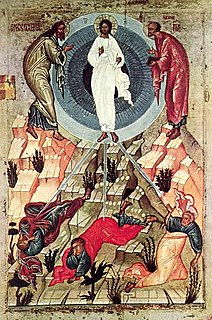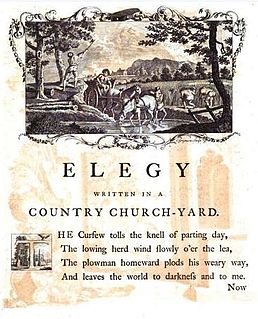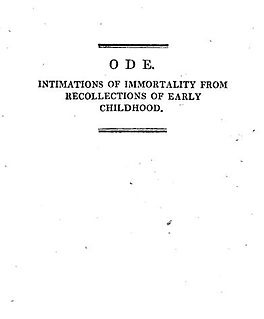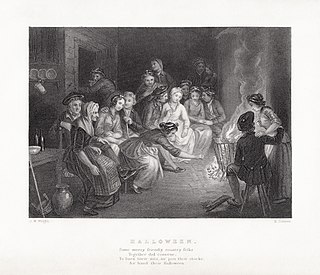
Kubla Khan is a poem written by Samuel Taylor Coleridge, completed in 1797 and published in 1816. It is sometimes given the subtitles "A Vision in a Dream" and "A Fragment." According to Coleridge's preface to Kubla Khan, the poem was composed one night after he experienced an opium-influenced dream after reading a work describing Shangdu, the summer capital of the Mongol-led Yuan dynasty of China founded by Kublai Khan. Upon waking, he set about writing lines of poetry that came to him from the dream until he was interrupted by "a person from Porlock". The poem could not be completed according to its original 200–300 line plan as the interruption caused him to forget the lines. He left it unpublished and kept it for private readings for his friends until 1816 when, at the prompting of Lord Byron, it was published.

Loki is a god in Norse mythology. According to some sources, Loki is the son of Fárbauti and Laufey, and the brother of Helblindi and Býleistr. Loki is married to Sigyn and they have two sons, Narfi and Nari or Váli. By the jötunn Angrboða, Loki is the father of Hel, the wolf Fenrir, and the world serpent Jörmungandr. In the form of a mare, Loki was impregnated by the stallion Svaðilfari and gave birth to the eight-legged horse Sleipnir.

In Norse mythology, a valkyrie is one of a host of female figures who guide half of the souls of the dead to the god Odin's hall Valhalla, whereas the other half go to Freyja's afterlife field, Fólkvangr. There, the deceased warriors become einherjar. When the einherjar are not preparing for the events of Ragnarök, the valkyries bear them mead. Valkyries also appear as lovers of heroes and other mortals, where they are sometimes described as the daughters of royalty, sometimes accompanied by ravens and sometimes connected to swans or horses.

In Norse mythology, the einherjar literally "army of one", "those who fight alone") are those who have died in battle and are brought to Valhalla by valkyries. In Valhalla, the einherjar eat their fill of the nightly-resurrecting beast Sæhrímnir, and valkyries bring them mead. The einherjar prepare daily for the events of Ragnarök, when they will advance for an immense battle at the field of Vígríðr.
Ottava rima is a rhyming stanza form of Italian origin. Originally used for long poems on heroic themes, it later came to be popular in the writing of mock-heroic works. Its earliest known use is in the writings of Giovanni Boccaccio.

"Ode on a Grecian Urn" is a poem written by the English Romantic poet John Keats in May 1819, first published anonymously in Annals of the Fine Arts for 1819.

"In Memoriam A.H.H." is a poem by the British poet Alfred, Lord Tennyson, published in 1850. It is a requiem for the poet's beloved Cambridge friend Arthur Henry Hallam, who died suddenly of a cerebral haemorrhage in Vienna in 1833, aged 22. It contains some of Tennyson's most accomplished lyrical work, and is an unusually sustained exercise in lyric verse. It is widely considered to be one of the greatest poems of the 19th century.

Childe Harold's Pilgrimage is a long narrative poem in four parts written by Lord Byron. The poem was published between 1812 and 1818. Dedicated to "Ianthe", it describes the travels and reflections of a world-weary young man, who is disillusioned with a life of pleasure and revelry and looks for distraction in foreign lands. In a wider sense, it is an expression of the melancholy and disillusionment felt by a generation weary of the wars of the post-Revolutionary and Napoleonic eras. The title comes from the term childe, a medieval title for a young man who was a candidate for knighthood.

Dark Night of the Soul is a poem written by the 16th-century Spanish mystic and poet St. John of the Cross. The author himself did not give any title to his poem, on which he wrote two book-length commentaries: Ascent of Mount Carmel and The Dark Night.

Elegy Written in a Country Churchyard is a poem by Thomas Gray, completed in 1750 and first published in 1751. The poem's origins are unknown, but it was partly inspired by Gray's thoughts following the death of the poet Richard West in 1742. Originally titled Stanzas Wrote in a Country Church-Yard, the poem was completed when Gray was living near the Church of St Giles, Stoke Poges. It was sent to his friend Horace Walpole, who popularised the poem among London literary circles. Gray was eventually forced to publish the work on 15 February 1751 in order to preempt a magazine publisher from printing an unlicensed copy of the poem.
"September 1, 1939" is a poem by W. H. Auden written on the outbreak of World War II. It was first published in The New Republic issue of 18 October 1939, and in book form in Auden's collection Another Time (1940).
Thomas Yalden was an English poet and translator. Educated at Magdalen College, Yalden entered the Church of England, in which he obtained various preferments. His poems include A Hymn to Darkness, Pindaric Odes, and translations from the classics.

Ascent of Mount Carmel is a 16th-century spiritual treatise by Spanish Catholic mystic and poet Saint John of the Cross. The book is a systematic treatment of the ascetical life in pursuit of mystical union with Christ, giving advice and reporting on his own experience. Alongside another connected work by John, entitled The Dark Night, it details the so-called Dark Night of the Soul, when the individual Soul undergoes earthly and spiritual privations in search of union with God. These two works, together with John's The Living Flame of Love and the Spiritual Canticle, are regarded as some of the greatest works both in Christian mysticism and in the Spanish language.
"Ring Out, Wild Bells" is a poem by Alfred, Lord Tennyson. Published in 1850, the year he was appointed Poet Laureate, it forms part of In Memoriam, Tennyson's elegy to Arthur Henry Hallam, his sister's fiancé who died at the age of 22.

"Ode: Intimations of Immortality from Recollections of Early Childhood" is a poem by William Wordsworth, completed in 1804 and published in Poems, in Two Volumes (1807). The poem was completed in two parts, with the first four stanzas written among a series of poems composed in 1802 about childhood. The first part of the poem was completed on 27 March 1802 and a copy was provided to Wordsworth's friend and fellow poet, Samuel Taylor Coleridge, who responded with his own poem, "Dejection: An Ode", in April. The fourth stanza of the ode ends with a question, and Wordsworth was finally able to answer it with seven additional stanzas completed in early 1804. It was first printed as "Ode" in 1807, and it was not until 1815 that it was edited and reworked to the version that is currently known, "Ode: Intimations of Immortality".

On the Morning of Christ's Nativity is a nativity ode written by John Milton in 1629 and published in his Poems of Mr. John Milton (1645). The poem describes Christ's Incarnation and his overthrow of earthly and pagan powers. The poem also connects the Incarnation with Christ's Crucifixion.

"The Taill of the Cok and the Jasp" is a Middle Scots version of Aesop's Fable The Cock and the Jewel by the 15th-century Scottish poet Robert Henryson. It is the first in Henryson's collection known as the Morall Fabillis of Esope the Phrygian. The Cok and the Jasp is framed by a prologue and a moralitas, and as the first poem in the collection it operates on a number of levels, and in all its parts, to introduce the larger cycle.

In 1819, John Keats composed six odes, which are among his most famous and well-regarded poems. Keats wrote the first five poems, "Ode on a Grecian Urn", "Ode on Indolence", "Ode on Melancholy", "Ode to a Nightingale", and "Ode to Psyche" in quick succession during the spring, and he composed "To Autumn" in September. While the exact order in which Keats composed the poems is unknown, some critics contend that they form a thematic whole if arranged in sequence. As a whole, the odes represent Keats's attempt to create a new type of short lyrical poem, which influenced later generations.

"Halloween" is a poem written by the Scottish poet Robert Burns in 1785. First published in 1786, the poem is included in the Kilmarnock Edition. It is one of Burns' longer poems, with twenty-eight stanzas, and employs a mixture of Scots and English.
"Night" is a poem in the illuminated 1789 collection Songs of Innocence by William Blake, later incorporated into the larger compilation Songs of Innocence and of Experience. "Night" speaks about the coming of evil when darkness arrives, as angels protect and keep the sheep from the impending dangers.














